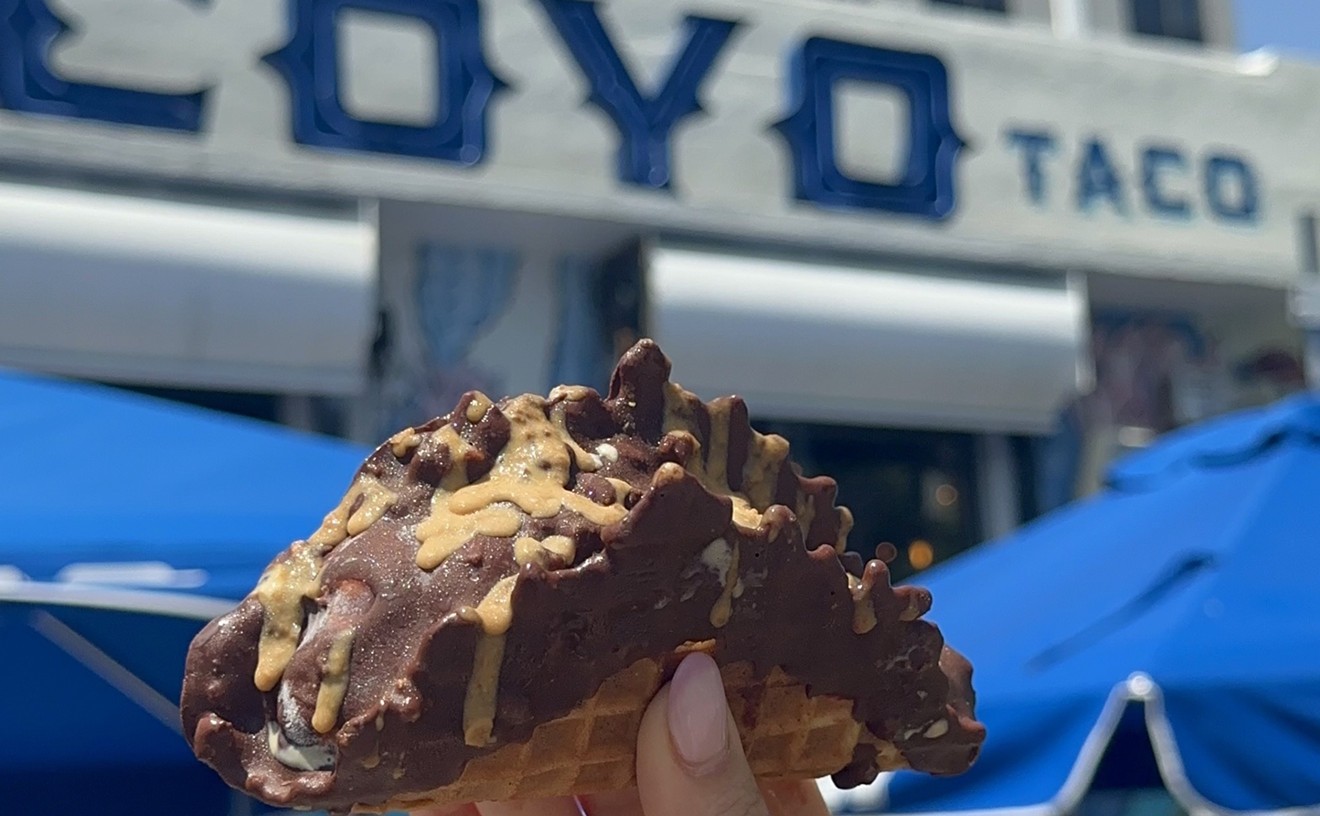I am more capable of comprehending Spanish in written form, so translating the menu was somewhat smoother sailing. Still, it was difficult to distinguish between categories of courses. For instance, was a $32 order of langoustines from San Lucar, Cádiz, meant to be an exotic starter or a modestly portioned entrée? Our waiter, who conveyed the proud bearing of a butler, offered his aid. He suggested a minisampling of three grilled shellfish: those effusively rich langoustines; scarlet-hue king prawns called carabineros ($34); and supersweet deep-sea lobster (cigales) from Motril ($38). Half of this, half of this, a little of this, he said, pointing to the items while speaking rapidly. Each of the three he selected was $30-plus for a full order, so I expected the plate would prove pricey, but along the lines of $45 to $50, not -- as it ended up costing -- $72. Turned out we were served a full order of the cigales.
I don't approve of such disingenuous tactics, but no one could deny that these garlicky crustaceans were delicately flavored and deliriously delicious. The reason La Dorada has been a mainstay of Giralda Avenue for nearly a dozen years is the availability and quality of such exceptional exotic seafood. Thrice weekly the restaurant places an order to the port city of Malaga at 11:15 p.m. (5:15 a.m. in Spain, when the fish market opens). The fish are then flown from those docks to Madrid, and a connecting flight lands them in Miami the same day. Specialties from the Mediterranean coast include merluza (hake), urta (red-band bream), lubina (striped sea bass), navajas (razor clams), cuttlefish (calamari-like), and dorada (royal sea bream, so named because of a golden crescent between the eyes).
Although airplane is the preferred mode of transport for the fish, La Dorada's two stories of multiple mustard-color dining rooms are uniformly decked out in a decidedly nautical décor -- a ship's steering wheel, bells, porthole mirrors, and a bounty of brass and wood appointments that conspire to emulate a turn-of-the-century ocean liner (which becomes a love boat every Friday and Saturday evening when a pianist performs romantic ballads). This is all a far cry from owner Felix Cabeza Jr.'s first restaurant, which he opened 45 years ago just off the beach in the small fishing village of Carihuela, Malaga. Cabeza's entrepreneurial spirit led to dining establishments in Seville, Barcelona, Madrid, Morocco, Paris, and, in 1996, Coral Gables. With many appetizers $18 and up, and entrées $30 to $40-plus, La Dorada might be considered the world's most expensive chain restaurant.
A complimentary basket of Catalan pan con tomate -- long, narrow pieces of toast rubbed with garlic and tomato -- arrives before dinner. So does a plate containing tiny pellets of bacalao fritters and a dish of garlic aioli. Both brought us onboard in buoyant fashion.
When cooking seafood of unimpeachable quality, one must do as little as possible to detract from the natural flavors. That Dorada understands this point is evident in appetizers such as razor clams unobtrusively spruced with an infusion of olive oil, parsley, and garlic; meaty steamed clams lightly lifted by garlic, parsley, and a hint of anise; fresh cured anchovy fillets pooled in nothing but a simple tomato coulis; and little triangular wedge shell clams (coquinas) tendered with just a touch of extra-virgin olive oil. Baby Bilbaína eels are also prepared in an uncomplicated manner -- the $90 price a reflection of this Basque delicacy's iconic status in the food world.
The deep fryer is to Andalusia what the barbecue grill is to America. Indeed it has been said that an Andalusian can fry air. Dorada's cooks confirm this proverb via golden, greaseless renditions of fried fresh anchovies (boquerones); whole baby squid; and wisps of baby whitefish (chanquetes), which in Spain are eaten in much the same spirit as potato chips are here -- except with aioli rather than onion dip.
The signature entrée (for two) is pescado a la sal, in which the fish you choose gets baked in a solid sea salt crust, cracked and filleted tableside, and served with extra-virgin olive oil, fresh garlic, and homemade mayonnaise. We selected the restaurant's namesake fish, a saltwater specimen whose white, moist, mildly sweet flesh boasted buttery, slightly nutty accents. The same sea bream ordered with "warm sizzling garlic and sherry vinegar" brought a drier, blander result -- no warmth, no sizzle, no vinegary tang. And rather than crisp, the dorada's skin, which is known to be especially flavorful, comes in a soft, steamed state here. Preparing things simply needn't mean precluding finesse.
Accompanying vegetables were the iceberg of our culinary cruise. Two cauliflower florets, and a three-stack of zucchini, tomato, and undercooked baby eggplant discs, summoned to mind the type of tepid, prearranged concoctions that helped contribute to the death of Continental cuisine. When dinner can cost upward of $100 per person, no component of the plate should be given short shrift.
Urta, found in the Bay of Cádiz and nearby Atlantic and Mediterranean waters, primarily feeds on shellfish, which lends the bream a pinkish color and rich flavor. The three oven-roasted fillets in our serving looked quite white but were sweetly fresh and sparklingly juicy. Dorada's urta comes traditionally garnished with a bedding of sliced potatoes and topped by a Catalonian picadillo of onions, red peppers, garlic, tomatoes, olive oil, and a splash of sherry vinegar.
This establishment has a reputation for making some of the best paellas in town: the classic fish and shellfish; vegetarian; and a black version cooked with squid and baby calamari. Alas, even a reviewer's budget has its limits. Next time.
Spain dominates the expensive, 250-bottle carta de vinos, winner of a Wine Spectator Award of Excellence. By-the-glass offerings are extensive. Not yet having seen the bill for the shellfish appetizer, we ordered two glasses without considering the price. When the check came, I was pleased that we were charged a mere $6.50 for La Moreira Albariño (a dry, floral white wine) and a dollar more for Riscal Tempranillo (a full-bodied red from Castilla y León) -- more than reasonable, which made me feel better about the waiter's intent. La Dorada relies on tourism to some degree, and the staff tilts toward that crowd too much, but service is formal, friendly, and for the most part on spot.
A large quantity of tocino del cielo, the Spanish egg-yolk custard so beloved by Cubans, is easy to prepare; you just need 25 egg yolks, a kilo of sugar, and some water. Unfortunately the rendition here tasted as if it were from the tail end of just such a voluminous batch. A stiff, flat square of chocolate mousse cake was likewise imbued with flavor that suggested too long a life in the fridge. Desserts are clearly not a strong suit, but el restaurante La Dorada sirve mariscos de selección frescos y de calidad frescos que trasciente cualquier idioma o estilo. Sorry. La Dorada serves distinctive seafood with a freshness and quality that come through in any language.











